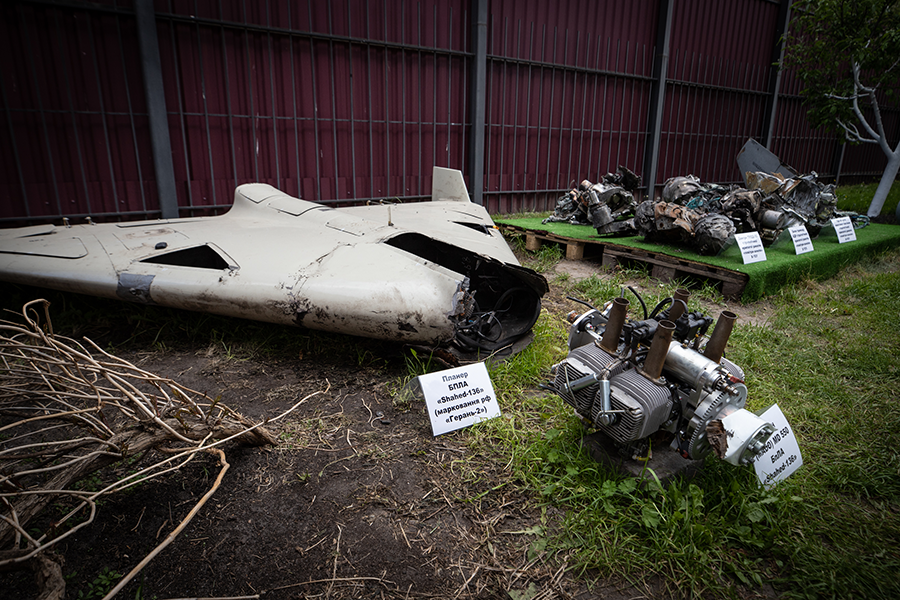"Though we have achieved progress, our work is not over. That is why I support the mission of the Arms Control Association. It is, quite simply, the most effective and important organization working in the field today."
States Urge UN Investigation of Iran Drone Sales
September 2023
By Kelsey Davenport
States urged UN Secretary-General António Guterres to investigate evidence that Iran exported drones to Russia in violation of Security Council restrictions, but action appears unlikely after the UN Secretariat did not act on a similar request last year.
 In a July 6 statement to the Security Council, France, Germany, and the United Kingdom accused Iran of escalating its violations of Security Council Resolution 2231 by “transferring hundreds” of drones to Russia since August 2022 “in the knowledge that Russia uses them to target Ukrainian cities and critical infrastructure.” The three states “strongly caution Iran against any further deliveries,” the statement said.
In a July 6 statement to the Security Council, France, Germany, and the United Kingdom accused Iran of escalating its violations of Security Council Resolution 2231 by “transferring hundreds” of drones to Russia since August 2022 “in the knowledge that Russia uses them to target Ukrainian cities and critical infrastructure.” The three states “strongly caution Iran against any further deliveries,” the statement said.
Iran is prohibited from exporting certain missiles, drones, and components relevant to building such systems under the resolution, which endorsed the 2015 nuclear deal, the Joint Comprehensive Plan of Action (JCPOA). The secretary-general reports biannually on implementation of the resolution. The July 6 council meeting included a briefing on the latest report, dated June 29.
According to that report, Ukraine submitted another letter to the secretary-general in June assessing that components recovered from drone debris are of Iranian origin and that the drones used in attacks against Ukraine were transferred “in a manner inconsistent” with Resolution 2231. The UK also submitted an assessment of two drones recovered by Ukraine. In a May 18 letter to the secretary-general, the UK said the drones were the Iranian Shahed-131 and Shahed-136 systems and transferred to Russia in violation of Resolution 2231.
In two letters to the secretary-general in May and June, Iran rejected the allegations and said the evidence “lacks credibility.” It said the resolution prohibits the transfer of items that could contribute to nuclear weapons delivery systems and that Iran “never manufactured or supplied, nor does it intend to manufacture or supply” such items.
The three European states and Ukraine requested that the secretary-general examine the drone debris. These countries, along with the United States, made a similar request ahead of the prior implementation report, but the UN Secretariat did not follow through.
U.S. Ambassador Linda Thomas-Greenfield said in a July 6 statement that the secretary-general’s failure to accept requests to “review indisputable evidence of these violations” is an “inexplicable lapse.”
Russian Ambassador Vassily Nebenzia argued that the secretariat is “not authorized to take such action” and that it can only conduct “voluntary inquiries upon an invitation” from certain states. He said Russia would view any such investigation as “a deliberate provocation.”
Nebenzia called for the secretary-general to keep the reports on Resolution 2231 “well-balanced and objective.”
Although the secretariat did not investigate the evidence of Iranian drone transfers to Russia, it did follow up on a UK seizure of ballistic missile components in the Gulf of Oman in February, according to the June 29 report. The UK said the missile parts are for medium-range systems of Iranian origin. The report said the UN Secretariat is still analyzing information about the seizure but photographs of the systems show similar characteristics to the missiles the Houthis used against Saudi Arabia and the United Arab Emirates.
The missile and drone restrictions in Resolution 2231 expire in October unless one of the three European countries reimposes UN sanctions on Iran using a special mechanism in the resolution that cannot be vetoed. Despite Iran’s breaches of the JCPOA, it is unlikely that the Europeans will exercise this option unless Iran transfers ballistic missiles to Russia.
Iran has threatened to withdraw from the nuclear Nonproliferation Treaty if the UN sanctions are reimposed.
